人教新目标版英语七年级上册《Unit5 Do you have a soccer ball》课件
人教版新目标英语初一上册unit5
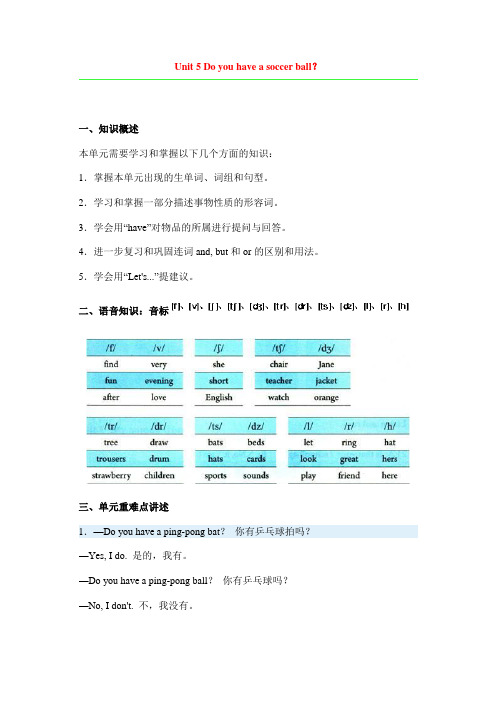
Unit 5 Do you have a soccer ball?一、知识概述本单元需要学习和掌握以下几个方面的知识:1.掌握本单元出现的生单词、词组和句型。
2.学习和掌握一部分描述事物性质的形容词。
3.学会用“have”对物品的所属进行提问与回答。
4.进一步复习和巩固连词and, but和or的区别和用法。
5.学会用“Let's...”提建议。
二、语音知识:音标三、单元重难点讲述1.—Do you have a ping-pong bat?你有乒乓球拍吗?—Yes, I do. 是的,我有。
—Do you have a ping-pong ball?你有乒乓球吗?—No, I don't. 不,我没有。
※动词have的用法:(1)have v.有(用于第一、二人称和第三人称复数)e.g.I have a new book.我有一本新书。
They have many interesting books.他们有许多有趣的书。
(2)have用于第三人称单数时应该用has。
e.g.Jim has a volleyball.吉姆有一个排球。
Rose has a tennis racket.露丝有一个网球拍。
(3)询问别人“有……吗?”要借助于助动词“do”来构成一般疑问句。
“?”句型。
肯定回答用“Yes”,否定回答用“No”。
e.g.-Do you have a bike?你有自行车吗?-Yes, I do. / No, I don't.有。
/ 没有。
-Do they have a basketball?他们有篮球吗?-Yes, they do. / No, they don't.有。
/没有。
对单数第三人称提问时则应用助动词“does”,此时其后的动词“has”就应还原成“have”。
e.g.-Does she have a soccer ball?她有足球吗?-Yes, she does. / No, she doesn't.是的,她有。
最新人教新目标版中学七年级英语上册 Unit 5 Do you have a soccer ball?单元教案1 (新版)

精品教育资料Unit 5 Do you have a soccer ball?一、单元教学内容分析二、教学目标1、能力目标(1)对所属关系进行问答,如:Do you have a soccer ball?(2)提出建议,发出邀请。
如:Let’s play soc cer.(3)谈论自己的感受。
如:That sounds good.2、知识目标(1)have 的一般现在时用法(2)一些体育用品名称(3)表达感受的几个形容词(4)提出建议的句型:Let’s… .3、情感态度目标(1)由于该单元话题贴近学生生活,符合他们热爱运动的心理,可以提高他们学习英语的兴趣,积极参与英语实践活动。
(2)谈论与朋友共度时光,培养同学间团结,友爱的精神。
(3)谈论自己的感受,同时使学生在英语交流中注意并理解他们的情感。
三、教学重点难点1、教学重点Dri ll: Do you/they have…?Does he/she have…?I don’t have…?He/She doesn’t have… .Let’s… .That sounds… .2、教学难点have 在一般现在时中的肯定,否定,一般疑问等形式。
尤其当主语为第三人称单数时。
四、课时安排1、SectionA 1a. 1b. 1c. 2a. 2b. 2c2、SectionA 2d .3a. 3b. 3c3、SectionB 1a. 1b. 1c.1d. 2a. 2b. 2c4、SectionB 3a. 3b. 3c. self check 1、2Period One SectionA 1a-2c一、教学目标1、单词:soccer ball ,tennis racket ,ping-pong ball ,volleyball ,have, basketball ,bat, does, doesn’t2、句型:I have…He/She has…Do you have a… ?Yes, I do./No,I don’t.Does he/she have…?精品教育资料Yes, he/she does./No, he/she doesn’t.二、教学重点:掌握关于运动物品的名词三、教学难点:学会使用句型 I have…He/She has…Do you have a… ?Yes, I do./No,I don’t.Does he/she have…?Yes, he/she does./No, he/she doesn’t.四、教学设计Step1 Lead-in1.What’s this in English ?How do you spell it?What colour is it?2. Talk about the pictures.3. Guessing game.4. Do 1a and 1b.Step2 PresentationSaying:This is my basketball. I have a basketball.Help Ss repeat with other items.I have a backpack. Do you have a backpack?Help the Ss answer :Yes ,I do./No,I don’t.4. Repeat with other things.S tep3 PracticeAsk and answer “Do you have…?”in two parts.Talk about the picture in pairs.Do 2a and 2b.Step4 Presentation1. This is Jim. He has a… This is Lily. She has…2. Ask: Does he/she have…? Help Ss answer: Yes, he/she does./No, he/she doesn’t.Step5 PracticeTalk about the pictures in pairs.Observe the picture .Then ask and answer in pairs.Work in groups of three.Do you have…?Does he/she have…?Step6 HomeworkRecite the new words.Do exercises in exercise books.Period Two SectionA 2d-3c一、教学目标1、单词:don’t, doesn’t, let’s, play, well, sound, good,sport, we, many, club, more, class2、句型:I don’t have…精品教育资料He /She doesn’t have ...They have…They don’t have…Do they have…?Yes, they do./No, they don’t.Let’s play soccer.That sounds good.二、教学重点:掌握否定句have的用法三、教学难点:学会使用句型Let’s … .I don’t have a…He /She doesn’t have ...That sounds good.四、教学设计Step1 Warming-upPair work.What’s this in English ?How do you spell it?2. Guessing game:What do I have in my bag?Do you have a computer?No,I don’t./Yes, I do.Work in groups of three.Step2 PresentationThis is Lucy and Lily’s room. They have… They don’t have…Do they have…?Yes, they do./No, they don’t.Step3 PracticeMemory challenge.Observe my parents’room. Then ask and answer in pairs.Talk about your family in pairs.Step4 PresentationI have… I don’t have…He/She has… He/She doesn’t have…Step5 Practice1. Talk about your room.I have… I don’t have…2. Repeat what the student says.He/She has… H e/She doesn’t have…Step6 PresentationRead the dialogue. Then practice in pairs.Give a model.A: Let’s play basketball.B: I don’t have a basketball.A: Well, Let’s play baseball.精品教育资料B: That sounds good.Practice the dialogue in pairs.Step7 PracticeDo 3a and 3c.Step8 SummaryStep9 Homework1.Recite the new words and the dialogue.2.Do exercises in exercise books.Period Three Section B 1a-2c一、教学目标1、单词:inter esting, boring, fun, difficult, relaxing, watch TV2、句型: Let’s… .That sounds… .二、教学重点:掌握表示感受的有关形容词三、教学难点:正确使用表示感受的形容词四、教学设计Step1 Warming upChoose a student to be Wang Xiaoya. The others act as reporters, ask questions.Make a report.Talk about the twins in pairs.Make a report.Step2 PresentationTeach the new words: interesting, boring, fun, difficult, relaxing.Read the new words.Step3 PracticeDo 1a, 1b and 1c.Talk about the pictures in pairs.(1d)Free talk in pairs.Fill in the blanks.Do 2a.Read the conversation in 2b ,do 2c.Step9 Homework1.Recite the new words and the dialogue.2.Do exercises in exercise books.Period four Section B 3a-3c, self check一、教学目标1、单词:soccer , volleyball, basketball, tennis, ping-pong, bat, racket, interesting, boring, fun, difficult, relaxing2、句型:.Do you have…? Does she/he have…? But句型 , It is interesting/ boring…二、教学重点、难点:掌握But转折句型的用法正确使用表示感受的形容词四、教学设计Step1 PracticeDo 3a and 3b.Free talk in pairs:精品教育资料Talk about the sports equipment in pairs.。
人教版新课标英语七年级上册《Unit 5 Do you have a soccer ball Sec
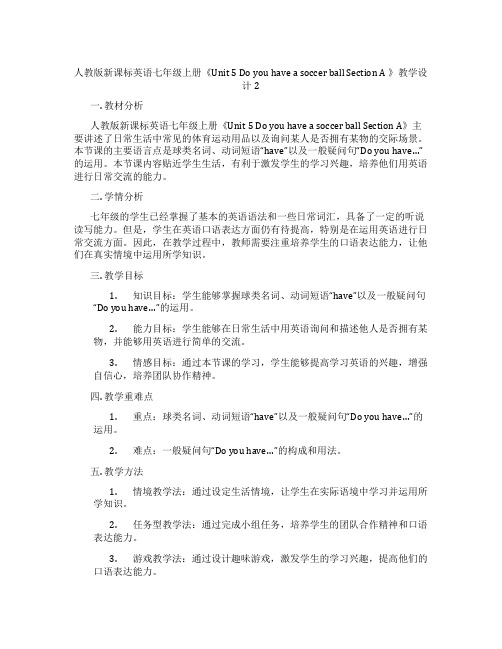
人教版新课标英语七年级上册《Unit 5 Do you have a soccer ball Section A 》教学设计2一. 教材分析人教版新课标英语七年级上册《Unit 5 Do you have a soccer ball Section A》主要讲述了日常生活中常见的体育运动用品以及询问某人是否拥有某物的交际场景。
本节课的主要语言点是球类名词、动词短语“have”以及一般疑问句“Do you have…”的运用。
本节课内容贴近学生生活,有利于激发学生的学习兴趣,培养他们用英语进行日常交流的能力。
二. 学情分析七年级的学生已经掌握了基本的英语语法和一些日常词汇,具备了一定的听说读写能力。
但是,学生在英语口语表达方面仍有待提高,特别是在运用英语进行日常交流方面。
因此,在教学过程中,教师需要注重培养学生的口语表达能力,让他们在真实情境中运用所学知识。
三. 教学目标1.知识目标:学生能够掌握球类名词、动词短语“have”以及一般疑问句“Do you have…”的运用。
2.能力目标:学生能够在日常生活中用英语询问和描述他人是否拥有某物,并能够用英语进行简单的交流。
3.情感目标:通过本节课的学习,学生能够提高学习英语的兴趣,增强自信心,培养团队协作精神。
四. 教学重难点1.重点:球类名词、动词短语“have”以及一般疑问句“Do you have…”的运用。
2.难点:一般疑问句“Do you have…”的构成和用法。
五. 教学方法1.情境教学法:通过设定生活情境,让学生在实际语境中学习并运用所学知识。
2.任务型教学法:通过完成小组任务,培养学生的团队合作精神和口语表达能力。
3.游戏教学法:通过设计趣味游戏,激发学生的学习兴趣,提高他们的口语表达能力。
六. 教学准备1.教师准备:提前准备好教学课件、球类图片、实物球类等教学资源。
2.学生准备:预习本节课内容,了解球类名词和动词短语“have”的用法。
英语人教版七年级上册Unit 5 Do you have a.....
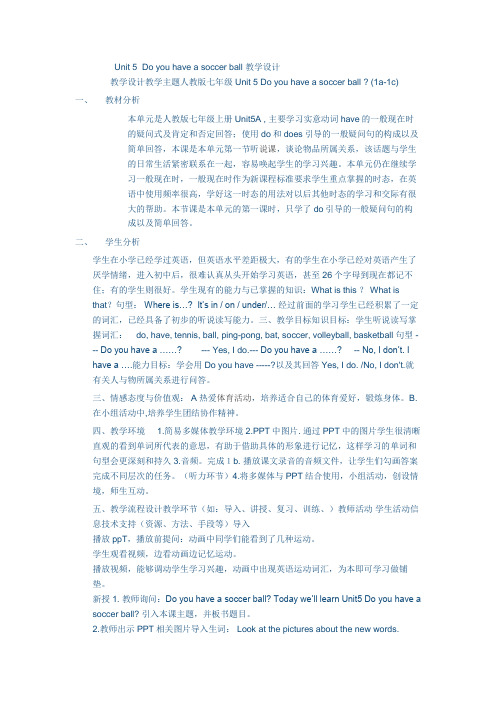
Unit 5 Do you have a soccer ball 教学设计教学设计教学主题人教版七年级 Unit 5 Do you have a soccer ball ? (1a-1c)一、教材分析本单元是人教版七年级上册Unit5A , 主要学习实意动词have的一般现在时的疑问式及肯定和否定回答;使用do和does引导的一般疑问句的构成以及简单回答,本课是本单元第一节听说课,谈论物品所属关系,该话题与学生的日常生活紧密联系在一起,容易唤起学生的学习兴趣。
本单元仍在继续学习一般现在时,一般现在时作为新课程标准要求学生重点掌握的时态,在英语中使用频率很高,学好这一时态的用法对以后其他时态的学习和交际有很大的帮助。
本节课是本单元的第一课时,只学了do引导的一般疑问句的构成以及简单回答。
二、学生分析学生在小学已经学过英语,但英语水平差距极大,有的学生在小学已经对英语产生了厌学情绪,进入初中后,很难认真从头开始学习英语,甚至26个字母到现在都记不住;有的学生则很好。
学生现有的能力与已掌握的知识:What is this ? What isthat?句型:Where is…?It’s in / on / under/… 经过前面的学习学生已经积累了一定的词汇,已经具备了初步的听说读写能力。
三、教学目标知识目标:学生听说读写掌握词汇:do, have, tennis, ball, ping-pong, bat, soccer, volleyball, basketball 句型 --- Do you have a ……? --- Yes, I do.--- Do you have a ……? -- No, I don’t. I have a ….能力目标:学会用Do you have -----?以及其回答Yes, I do. /No, I don't.就有关人与物所属关系进行问答。
三、情感态度与价值观: A热爱体育活动,培养适合自己的体育爱好,锻炼身体。
新目标人教版初中英语七年级上册Unit5Doyouhaveasoccerball4
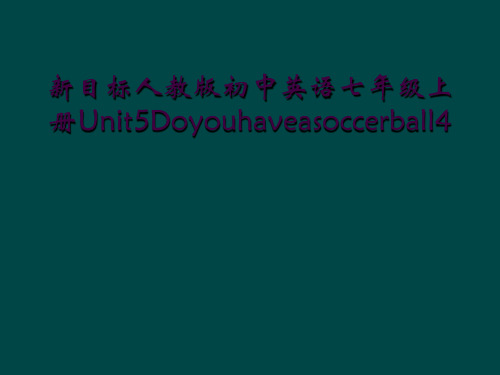
They don’t have any boats.
1、I have an English book.
Do you have an English book? 一般疑问句 Yes,I do. No,I don’t.
I don’t have an English book. 否定句
2. The brothers go to school at 7:00.
Do the brothers go to school at 7:00? 一般疑问句 Yes,they do. No,they don’t
The brothers don’t go to school at 7:00. 否定句 3.Miss Wang has a big family. Does Miss Wang have a big family? 一般疑问句 Yes,she does. No,she doesn’t
7.What __A___in your backpack?----There are some apples.
8.There is an orange _C____the picture.
9.There __C___many pens in the shop(商店).
10.That is a photo ___C__my sister.
10.He has a watch.(变疑问句及否定句) ____D_o_e_s_h_e__h_a_v_e_a__w_a_t_c_h_?___
____H__e_d_o_e_s_n_’_t _h_a_v_e_a__w_a_t_c_h.
完成下列短语 play play
最新人教新目标版七年级英语上册Unit 5 Do you have a soccer ball?(第3课时)教案 (新版)

Unit 5 Do you have a soccer ball?(第3课时)教学目标:1. 能正确熟读P 28的单词并掌握书写。
2. 听录音,熟记重点形容词。
3. 掌握知识探究内容,并能正确应用。
重点单词:interesting boring fun difficult relaxing watch watch TV 重点句型:Let’s play computer games. That sounds interesting.教学重点:掌握新单词。
教学难点:形容词interesting与interested的区别教学工具:多媒体,导学案Teaching steps:Step 1: Greeting.1. Have a review by thinking back to the knowledge of the last lesson.2. Let ss complete the test one by one.3. Do 1a. Match the words with the pictures.4. Show the aims by the multi-media. Then ask ss to read aloud the aims of the guide together.Step 2: Self-exploration1. Complete the vocabulary part2. Complete the listening part3. Complete the knowledge partStep 3: Cooperative communication1. Check the answers of self-exploration with your group members.2. Role-play the conversation of 1c on page 28 .Step 4: Results show1. Ask ss to show the answers to the questions of self-exploration one by one.2. Role play. Ask four groups to make dialogues of 1c.Step 5: Training consolidation基础题—单项选择1. _____ play ping-pong. It’s an ________ game.A. Let’s; funB. Let’s; interestingC. Let’s; boringD. He; interesting2. —Let’s play football. — _______.A. No, I don’t.B. That sounds interestingC. OK! It’s boring.D. Yes, I do.3. I watch soccer games _____ TV.A. onB. atC. inD. to4. He _______ sports on TV every day.A. hasB. haveC. watchD. watches5. Mr. Black doesn’t like the lecture(演讲)。
最新人教版初一七年级英语上册新目标英语七年级上unit_5_Do_you_have_a_soccer_ball(全课件)

Yes, he does. No, he doesn’t. Yes, she does. No, she doesn’t. No, he doesn’t . 否定回答
Does he have a ping-pong ball? Yes ,he does . 一般疑问句 Does she have a/an…? Yes, she does. No, she doesn’t. 肯定回答
For example:
My name is… / I am… I am in Class …Grade… I have a/an… / I don’t have a/an … I want to play…
Let’s play soccer. I don’t have a soccer ball. Let’s play … That sounds good.
soccer ball
Let’s read and remember:
Do you have a TV? Do they have a volleyball? Does he have a basketball? Does she have a tennis? Yes, I do. Yes, they do. No, I don’t No, they don’t.
2a&2b
Listen
3
1
4
2
Let’s read and remember:
Do you have a TV? Do they have a volleyball? Does he have a basketball? Does she have a tennis? Yes, I do. Yes, they do. No, I don’t No, they don’t.
人教版新目标英语七年级上册Unit_5_Do_you_have_a_soccer_ball_全单元课件_(新版)人教新目标版_2.ppt

Helen’s baseball bat jacket hat We don’t know.
Pairwork
2d Role-play the conversation.
Cindy: Hey, Helen, let’s go! We’re late. Helen: OK. Cindy: Do you have the baseball? Helen: Yes, I do. It’s in my bag. Cindy: And where’s our baseball bat? Helen: Bill has it. Cindy: Oh, yeah. And do you have your jacket? Helen: Oh, no, I don’t. It’s on the chair. Let me get it. Cindy: And your hat, too! Helen: OK, I have my jacket and hat. Let’s go.
1
2
Listening
Listen again. Match the pictures 2b in 2a with the balls.
3
2
1
4
Pairwork 2c Ask and answer about the people in 2a.
Does Jane have a tennis ball?
Does Linda have a schoolbag? Yes, she does. No, she doesn’t.
Linda
Does Anna have a schoolbag?
Anna
1a
Match the words with the things in the picture.
人教版新目标版七年级英语上册Unit5Doyouhaveasoccerball教案
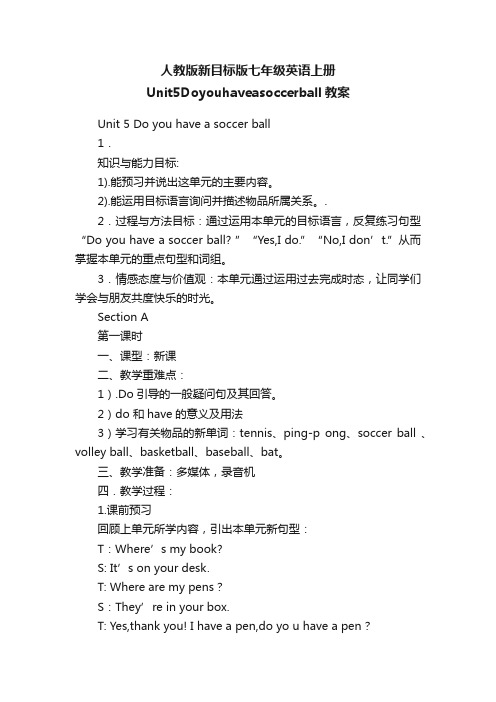
人教版新目标版七年级英语上册Unit5Doyouhaveasoccerball教案Unit 5 Do you have a soccer ball1.知识与能力目标:1).能预习并说出这单元的主要内容。
2).能运用目标语言询问并描述物品所属关系。
.2.过程与方法目标:通过运用本单元的目标语言,反复练习句型“Do you have a soccer ball? ”“Yes,I do.”“No,I don’t.”从而掌握本单元的重点句型和词组。
3.情感态度与价值观:本单元通过运用过去完成时态,让同学们学会与朋友共度快乐的时光。
Section A第一课时一、课型:新课二、教学重难点:1).Do引导的一般疑问句及其回答。
2)do 和have的意义及用法3)学习有关物品的新单词:tennis、ping-p ong、soccer ball 、volley ball、basketball、baseball、bat。
三、教学准备:多媒体,录音机四.教学过程:1.课前预习回顾上单元所学内容,引出本单元新句型:T:Where’s my book?S: It’s on your desk.T: Where are my pens?S:They’re in your box.T: Yes,thank you! I have a pen,do yo u have a pen?S:Yes,I do./No,I don’t.2.正课教授(1)引入①观察25页图片,引入新单词的学习。
②学习do引导的一般疑问句及其肯定回答和否定回答。
have的用法:①have为实义动词,意为“有”,常用句型sb.have/has+sth.表示某人有某物。
当主语为第三人称单数时,have用其第三人称单数形式。
②have还有“吃、喝”的意思,如:have breakfast。
③含有have的句子变否定句要在have前加don’t;含有has的句子变否定句要在h as前加doesn’t,has变为have。
学科信息:英语-人教新目标版-七年级上Unit 5 Do you have a soccer ball_
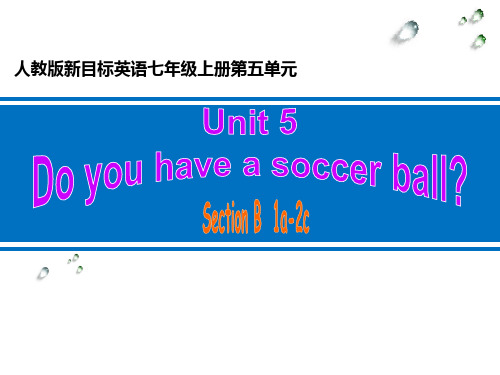
Unit 5 Do you have a soccer ball?
人教版新目标七年级上册第五单元Section B 1a-2c
○
Unit 5 Do you have a soccer ball?
人教版新目标七年级上册第五单元Section B 1a-2c
I want to be friends with you! Do you want to be friends with me?
Unit 5 Do you have a soccer ball?
人教版新目标七年级上册第五单元Section B 1a-2c
be friends
James thinks basketball is e______ /s_______. asy
imple
Unit 5 Do you have a soccer ball?
Unit 5 Do you have a soccer ball?
人教版新目标七年级上册第五单元Section B 1a-2c
1b Listen and check ( that you hear in 1a.
)the description words
Let’s listen.
1. interesting 2.boring
人教版新目标七年级上册第五单元Section B 1a-2c
be friends
This kind of swimming is very n______. ice
Unit 5 Do you have a soccer ball?
人教版新目标七年级上册第五单元Section B 1a-2c
be friends
Jenny: Let’s
人教版英语七年级上册Unit-5--do-you-have-a-soccer-ball

人教版英语七年级上册Unit 5 Do you have a soccer ball?单元教材分析本单元主要学习动词have的一般现在时的用法;使用do和does引导的一般疑问句的构成以及简单回答。
本单元围绕“和朋友一起欢度时光”这一话题安排了三个任务:一是列举所学的运动项目,从中挑选出各自喜欢的体育项目,并说明原因,目的是巩固并新学一些体育项目的名词;二是让学生互相询问所爱好的运动,并根据情况发出邀请,学会用have对物品的所属进行提问与回答,掌握用do和does引导的一般疑问句的构成及使用,了解用Let’s提建议的句型;三是写作,把任务一、二的完成情况写成日记,进一步复习、巩固所学的语言目标。
通过本单元的学习,学会用have对物品的所属进行提问与回答;学会用let’s…句型提建议;能够谈论自己喜欢哪些球类运动,不喜欢哪些球类运动及原因;能够谈论怎样和自己的朋友度过一段愉快的时光。
单元总体目标.1. 在询问对方是否有某物的对话中学会使用do和does引导的一般疑问句。
2. 学会使用描述性的形容词来评价事物。
3. 学会在对话中使用名词复数。
4. 学会用祈使句来向对方提出建议。
5. 学会用祈使句询问某人是否有某物。
6. 学会向他人提出建议的句子。
7. 学习了解一般现在时。
8. 在本单元中,通过阅读有关运动的文章和对话,使学生更加热爱体育活动并培养一种适合自己的体育爱好。
9.在小组活动中,培养学生团结协作精神。
本单元的主题是使用have对物品的所属进行提问及回答,以掌握行为动词在一般现在时中的构成和使用;同时引导学生使用所学的句型谈论自己在球类运动中的喜好。
行为动词在一般现在时的肯定句、否定句和一般疑问句中的构成和使用是初中英语教学中非常重要的内容,本单元知识的掌握程度将直接影响今后的英语学习。
学生在以前的学习中已经掌握了be动词在一般现在时中的构成和使用,在学生的头脑中也已经形成了一个模式,这种模式将直接影响学生对本单元知识内容的接受,所以教师在教学中一定要善于引导,以免学生养成不良习惯。
2019人教新目标英语七年级上册Unit5Doyouhaveasoccerball语法精讲(dohave语文

名师指导:助动词do的用法小节do作实义动词时的意思是“做,实行,尽力”等,而在作助动词时没有意义,它的功能是在一般现在时和一般过去时中构成疑问句和否定句。
一、构成疑问句Do you speak English? 你说英语吗?这句话的肯定形式是:You speak English. 你说英语。
当你需要表达“你说英语吗?”这样的意思时,需要把句子改成疑问句。
英语的疑问句需要以助动词开头,而一般现在时和一般过去时的句子中没有助动词,这样就需要加一个助动词do。
而在其它时态的句子中都有助动词,如将来时的will,完成时的have,进行时的be动词,这些句子只需要把其中的助动词移到主语之前并在句尾加上问号就可以构成疑问句。
You speak English. Do you speak English ?如果主语是第三人称单数,do改变does,如:Does she speak Spanish? 她说西班牙语吗?如果是已经发生的事情进行提问,do改为did,如:Did they go? 他们去了吗?这样的句子称为一般疑问句,可以用“y es”或“n o”回答。
有时候我们需要询问时间、地点,这时需要在一般疑问句前面加上特殊疑问词。
如:I come from England. 我来自英格兰。
come from v. 来自, 出生于当我们想问对方来自哪里时,在助动词前再加上特殊疑问词where。
Where do you come from ? 你是从哪里来的?二、构成否定句:在一般现在时和一般过去时中,如果在实义动词前有情态动词,就直接在情态后面加not构成否定式,如果没有情态动词,就在实义动词前面加上do not,缩写成don’t。
请看下面的句子:I can speak English. 我能说英语。
这里的can是情态动词,speak是实义动词。
这个句子的否定形式是:I can’t speak English. 我不会说英语。
人教版七年级英语上册教案:Unit5 Do you have a socc
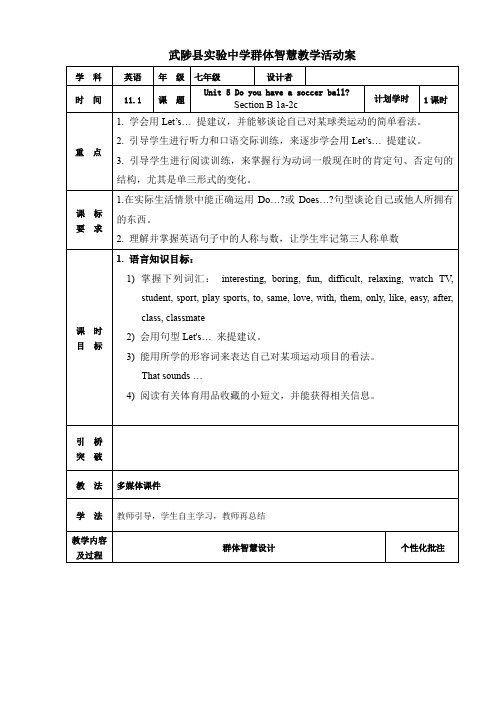
武陟县实验中学群体智慧教学活动案学科英语年级七年级设计者时间11.1 课题Unit 5 Do you have a soccer ball?Section B 1a-2c计划学时1课时重点1. 学会用Let’s…提建议,并能够谈论自己对某球类运动的简单看法。
2. 引导学生进行听力和口语交际训练,来逐步学会用Let’s…提建议。
3.引导学生进行阅读训练,来掌握行为动词一般现在时的肯定句、否定句的结构,尤其是单三形式的变化。
课标要求1.在实际生活情景中能正确运用Do…?或Does…?句型谈论自己或他人所拥有的东西。
2. 理解并掌握英语句子中的人称与数,让学生牢记第三人称单数课时目标1. 语言知识目标:1) 掌握下列词汇:interesting, boring, fun, difficult, relaxing, watch TV,student, sport, play sports, to, same, love, with, them, only, like, easy, after, class, classmate2) 会用句型Let's…来提建议。
3) 能用所学的形容词来表达自己对某项运动项目的看法。
That sounds …4) 阅读有关体育用品收藏的小短文,并能获得相关信息。
引桥突破教法多媒体课件学法教师引导,学生自主学习,教师再总结教学内容及过程群体智慧设计个性化批注教学过程:Ⅰ. RevisionReview the expressions and sentence structures we have learned.Ⅱ. Presentation1. (Show the picture which a boy is doing an interesting thing on the screen.)Learn the new words, interesting(Show other pictures on the screen) learn the new words: boring, fun, difficult, relaxing, easy, in the same way2. (Show some activity pictures on the screen)Learn the new phrases: "watch TV", "go to the same school", "love soccer", "after class" and "play sports"3. (Show some pictures of students on the screen)Learn the new words "student", "classmate"4. Let Ss read the new words and phrases and try to remember them.5. Read the words in 1a. (Point to the five words in 1a and ask students torepeat each one.)Ss: interesting, fun, relaxing, boring, difficult.(Let some Ss explain the Chinese meaning of them.)Then match each picture with one of the words.(Point to the five pictures and ask students to match them.)Check the answers.Ⅲ. Listening1. Next we’ll listen to a conversation. Here are two boys in theconversation. What do they want to do? Listen.(Play the recording the first time.) (For the first time, students only listen.)2. Listen again and check the words you hear in 1a. (Play the recording again.)3. Check the answers.4. Practice in recognizing specific vocabulary words in conversation andin writing them. First, listen to the recording in 1b. What does Paul say 单词的讲解和学习:长单词读音拼写的掌握:强化音节,按音节拼写和记忆单词。
- 1、下载文档前请自行甄别文档内容的完整性,平台不提供额外的编辑、内容补充、找答案等附加服务。
- 2、"仅部分预览"的文档,不可在线预览部分如存在完整性等问题,可反馈申请退款(可完整预览的文档不适用该条件!)。
- 3、如文档侵犯您的权益,请联系客服反馈,我们会尽快为您处理(人工客服工作时间:9:00-18:30)。
Report time
2a &2b Listen to the conversations. Number the pictures (14). Match the pictures in 2a with the balls
3
4
2 3 2 4
Listen again. Match the person with the ball if he/she has it.
Alan
Mike
Jane
Dale’s brother
Does Alan have …? Yes, he does. He has… /No, he doesn’t. He doesn’t have…
2d Role-play the conversation.
Cindy: Hey, Helen, let’s go! We’re late. Helen: OK. Cindy: Do you have the baseball? Helen: Yes, I do. It’s in my bag. Cindy: And where’s our baseball bat? Helen: Bill has it. Cindy: Oh, yeah. And do you have your jacket? Helen: Oh, no, I don’t. It’s on the chair. Let me get it. Cindy: And your hat, too! Helen: OK, I have my jacket and hat. Let’s go.
Do you have a tennis ball? □Yeo you have a baseball bat? □Yes, I do. □No, I don’t. Do you have a ping-pong bat? □Yes, I do. □ No, I don’t.
A: Hey..., let's...! We're...! B: OK. A: Do you have the ...? B: Yes, .... It's ... my bag. A: And where's our...? B: ... has it. A: Oh, yeah. And do you have your ...? B: Oh, no, I don't. It's ... the chair. Let me ... it. A: And your ..., too! B: OK, I have my ... and.... Let's ...!
Do you have a basketball? □Yes, I do. □No, I don’t.
What sport do you like best? Soccer □Basketball □Tennis □Ping-ping □________ Do you have a basketball? □Yes, I do. □No, I don’t.
What sport do you like best? □Soccer □Basketball □Tennis □Ping-ping□_________ Do you have a soccer ball? □Yes, I do. □No, I don’t. Do you have a ping-pong bat?□Yes, I do. □No, I don’t. Do you have a basketball? □Yes, I do. □No, I don’t. Do you have a volleyball? □Yes, I do. □ No, I don’t.
A: Hey..., let's...!... B: ... A: Do you ...? B: Yes, ... A: And where's...? B: ... A: Oh, ... And do you ...? B: Oh, no, ... It's ... A: And your ... ! B: ...!
Do you have a volleyball? □Yes, I do. □No, I don’t.
Do you have a badminton? □Yes, I do. □No, I don’t. Do you have a tennis ball? □Yes, I do. □No, I don’t.
A
B
Let’s join the Sports club(俱乐部)!
A
B
C
D
What sport do you like best? □Soccer □Basketball □Tennis □Ping-ping □_____
What sport do you like best? □Soccer □Basketball □Tennis □Ping-ping □________ Do you have a baseball? □Yes, I do. □No, I don’t.
Unit 5
Do you have a soccer ball?
Section A 1a-2d
1b
Listen and circle the words your hear.
soccer ball ping-pong ball
ping-pong bat volleyball
Do you have…? Yes, I do. / No, I don’t. I have…
Do you have a soccer ball? □Yes, I do. □No, I don’t.
Do you have a ping-pong ball? □Yes, I do. □No, I don’t. Do you have a volleyball? □Yes, I do. □ No, I don’t.
